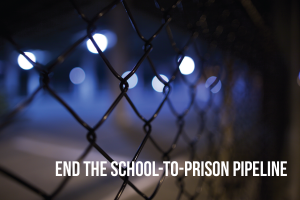Published in the Free Lance-Star
As a black man, Spotsylvania resident Cliff Vaughn said there are times he feels unwelcome in the community, citing Confederate flags and other examples and experiences.
“I’ve heard people say, ‘That’s my heritage,’ ” Vaughn said. “When I look around, the reality is, what I’m living—regardless of whether it’s heritage or hatred—the end result to me is the same.”![]()
Vaughn was one of several speakers who addressed the Spotsylvania School Board recently regarding the “school-to-prison pipeline,” a statistical trend that demonstrates that disabled and minority students—particularly black students—are suspended at numbers significantly higher than their share of the population.
Nationally, black students are suspended three times as often as white students, and suspended students are more than three times as likely to end up in the juvenile justice system in the following year, according to the American Civil Liberties Union.
Vaughn believes the statistics show the result of implicit bias, or learned attitudes people don’t realize they have—and also intentional rejection.
“When I see those Confederate flags, what they say to me personally is, ‘You’re not wanted, you’re not a part of society in this country,’ ” he said. “[They say to me,] ‘We are against you, you don’t count, and we are going to do everything we can to continue to marginalize you.’ ”
Vaughn and the other speakers are connected with Virginia Organizing, a statewide grassroots community organizer group. The group, and others around the state, are waiting for new state guidelines for the agreements governing the placement and duties of police officers in schools, known as school resource officers, which are expected any day from the Virginia Department of Education and the Department of Justice.
The new guidelines follow increased attention to the issue in Virginia in recent years, and Gov. Terry McAuliffe’s announcement of a “Classrooms not Courtrooms” initiative last year.
The Spotsylvania administration has been discussing the inquity and the MOU with Virginia Organizing for about a year, schools spokeswoman Rene Daniels said, and the district has been addressing disciplinary issues for at least as long as she has been with the schools—six years.
“This has been on our radar,” she said. “We were already looking at it and we had already been working towards equity and ways to improve that, and staff training.”
Some of the district’s schools have started using Positive Behavior Interventions and Supports, or PBIS, an increasingly popular behavioral approach designed to proactively emphasize appropriate behavior more than reactively punish inappropriate behavior.
In Virginia, according to the 2011 federal data collection, the most recent analyzed federal data available, black students are about twice as likely as white students to receive one or more out-of-school suspensions.
Spotsylvania is typical in that respect. In the same data collection, 18.3 percent of Spotsylvania’s students were black, but about 36 percent of its out-of-school suspensions went to black students. Of expelled students, 37.5 percent were black.
In Stafford, according to the same data collection, the same percent of students were black—18.3 percent—but 31.5 percent of out-of-school suspensions were given to those students. Fifty percent of expelled students were black.
In recent years, based on state data, Spotsylvania’s numbers have improved. Its percentage of black students has dropped from about 21 percent in 2010-11 to about 19 percent in 2014-15. But the percentage of black individual students who received suspensions dropped from almost 38 percent to about 31 percent.
While Spotsylvania’s numbers aren’t dramatic compared to the state, that doesn’t mean anyone wants to ignore the fact that they’re too high everywhere, both Vaughn and Daniels said.
“It’s definitely something that I think all schools should be [thinking about],” Daniels said.
Vaughn said he wants better training and more clarity, and where necessary limitations, on school resource officers’ roles in schools.
“Now that the schools have had their budgets cut and can no longer hire the proper number of counselors or people to work with students who have problems, now they are assigning some of those responsibilities to the SRO,” he said. “That’s something the community needs to be aware of, be sensitive to, and we need to monitor it.”





